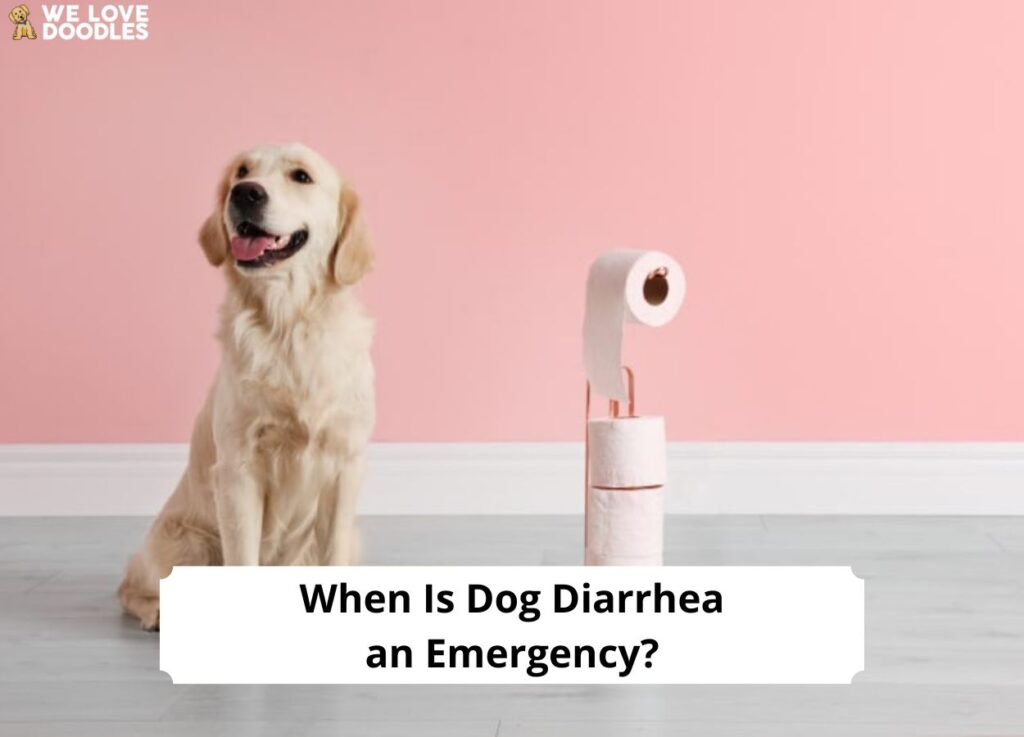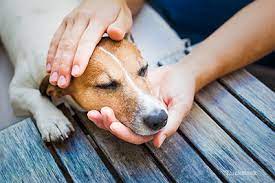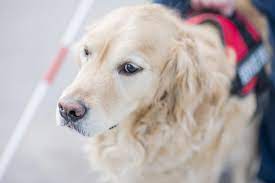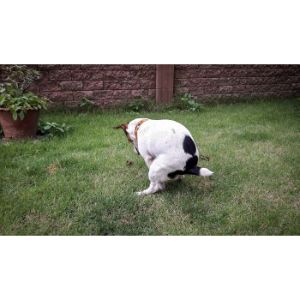
Most dogs will experience diarrhea at some point during their life. Although it may not appear serious, diarrhea can quickly become life-threatening. So, when is dog diarrhea a medical emergency?
Keep reading to learn when it’s time to take your dog to the vet because of diarrhea and how to help your dog in chronic diarrhea recovery.
Before scrolling down this guide, “When Is Dog Diarrhea an Emergency,” check out: When To Euthanize A Dog With Tracheal Collapse? (2023)
When Is It Time to Visit a Vet Because of Dog Diarrhea?

Many cases of diarrhea do not warrant a trip to the veterinarian. If your dog has diarrhea for only one day and is acting normally, it’s reasonable to believe it’ll recover without complications.
Furthermore, if there’re no other apparent signs and your dog can eat and drink, there’s no cause for alarm.
You should take diarrhea seriously if it persists for several days. Your dog probably has a chronic ailment if diarrhea worsens despite home treatment.
Some conditions that necessitate a vet’s diagnosis include intestinal parasites and inflammatory bowel disease. Although these ailments aren’t life-threatening, you should still take your pet to the veterinarian.
Signs of Diarrhea That Your Dog Needs Prompt Medical Attention

There’s always a possibility that something more serious is at play when your dog has diarrhea. Dog owners can prevent fatal outcomes by monitoring any signs of distress. If your dog exhibits any of these signs, you should take them to the veterinarian as soon as possible.
Blood in Stool
The presence of blood in your dog’s stool indicates they are ill. Once your dog defecates, look for any red or black stains on the stool. Bloody stains in your dog’s stool could mean they have internal bleeding. Bring your dog to a vet, who will take X-rays and diagnose the issue.
Vomiting

While vomiting doesn’t sound like a life-threatening situation, your dog may require immediate medical attention if it’s vomiting or having diarrhea.
Persistent vomiting implies the dog cannot absorb nutrients from its diet, which could result in severe weight loss and dehydration.
Dehydration
Your dog loses fluids when it vomits and has diarrhea. Continuous vomiting makes it impossible for them to replenish their lost fluids. You may check your dog for dehydration by pulling the skin around its neck and calculating how long it takes to return to its normal position.
Your dog may become severely sick if it loses excess body fluids. A veterinarian will administer intravenous fluids to your dog and then determine a proper diagnosis.
Lethargy

Lethargic dogs suffer from fatigue. As a result, they lack the desire to play with their toys or take a stroll. They may even refuse to move from their sleeping spot. Hyperactive dogs will show signs of lethargy very quickly.
Persistent Diarrhea
If your dog’s diarrhea lasts for more than a day, it may mean they’ve ingested something harmful to their digestive system, causing an obstruction. Diarrhea occurs when the digestive system is unable to eliminate an object. Immediate veterinary attention is necessary to detect and treat the underlying cause of diarrhea in dogs.
Prevalent Causes of Chronic Diarrhea in Dogs

Your dog might not get the full nutritional benefit from its meal if they experience prolonged diarrhea. Knowing the causes of chronic diarrhea will assist you in understanding when it is an emergency.
Possible reasons for your dog’s diarrhea include the following:
- Allergies
- Food
- Stress
Other factors that might induce diarrhea include viral infections and dietary abnormalities. Also, your dog’s digestive tract may become upset from eating a low-quality diet.
In addition, diarrhea may result from eating a diet high in carbohydrates and protein-deficient diets.
If your dog suffers from food intolerances, its diet may also be to blame for diarrhea. There’re many potential allergens in dog food, and it may take time to determine which one your dog is reacting to. If your vet suggests a diet trial, you must adhere to their specific instructions.
How Can You Treat a Dog’s Persistent Diarrhea at Home?

Here are several home therapies you might try if your dog has excessive diarrhea.
Give Your Dog Probiotics
Supplementing your dog’s diet with probiotics will restore a healthy balance to their digestive system. Ensure you choose high-quality products, preferably those your vet approves.
Eliminate Any Potential Sources of Stress and Anxiety

Stress and nervousness may exacerbate diarrhea. Because worms make dogs anxious, ensure that your dog has a deworming medication prescription from the vet. Don’t risk giving your dog human drugs, as most are dangerous to canines.
Help Your Dog to Fast
In addition to clearing the digestive tract, fasting can help relieve an upset stomach. Cutting their normal meal in half gives their stomach a reprieve. After two or three days, start reintroducing their regular diet slowly.
However, you must ensure your dog is in good health before putting them on a fasting routine. Senior dogs, young puppies, or sick ones have distinct energy requirements, so you shouldn’t fast them.
Give Them Bland Food

If your dog’s diarrhea symptoms don’t disappear after fasting, you should put them on a bland diet plan. A bland diet helps soothe your dog’s sensitive stomach.
Veterinarian Diagnosis of Chronic Diarrhea in Dogs

Your dog has chronic diarrhea if the condition lasts for over two weeks despite standard therapy or when they experience recurrent episodes of diarrhea that are never fully clear.
Your veterinarian will conduct a thorough physical examination. Based on your dog’s previous medical history, they may prescribe further testing to determine any of the following causes:
Inflammatory Bowel Disease (IBD)

Most dogs that suffer from inflammation of the intestines experience loss of appetite and subsequent weight loss. In most cases, testing will require further blood work, which you must send to a separate lab.
Infectious Disease
Bacterial and viral infections are common causes of diarrhea. There is a high chance that your vet will suggest fecal PCR panels to scan for possible reasons, such as clostridium.
Chronic diarrhea in dogs might have a microbial origin due to the continual proliferation of bacteria in the intestines. Treatment with long-term, low-dose antibiotics may be effective against such illnesses.
Refractory Diarrhea

Occasionally, dogs will experience refractory diarrhea, for which testing doesn’t point out a clear cause. These instances can be complex, necessitating confirmatory imaging such as ultrasonography and intestinal biopsies to diagnose the actual cause.
Underlying Illness
The veterinarian will perform further diagnostic testing if your dog’s diarrhea does not react to food treatments. It’s vital to ensure that your dog does not have systemic disorders that could trigger diarrhea.
Your vet may suggest a blood test, a urinalysis, and abdominal X-rays of your dog.
How Can I Manage and Help in My Dog’s Chronic Diarrhea Recovery?

Pay attention to the regularity and pattern of your dog’s bowel movements and report any variations to your vet as they occur.
It might be tempting to get over-the-counter diarrhea medication, but that could worsen the situation if the medicine isn’t appropriate for the underlying cause.
Don’t administer anti-diarrheal medication without consulting your vet to determine its safety and proper dosage. If you will be away from home for a long time, ensure you get your dog a caregiver.
How Much Does It Cost to Treat Emergency Diarrhea in Dogs?

The cost of treating emergency diarrhea in dogs is around $200. However, the actual cost depends on the severity of the condition.
If prescriptions and subsequent appointments are necessary, you may pay further costs.
What Can I Give My Dog to Stop Diarrhea Fast?

It would help if you fed your dog boiled rice. Besides having zero flavors, plain white rice is also high in soluble fiber, which is beneficial in hardening your dog’s stool by absorbing water in the digestive tract.
Is It Normal for Dogs to Randomly Get Diarrhea?

Yes. Dogs frequently ingest things that could cause stomach upset since they have a habit of sniffing around. Fortunately, most cases of diarrhea resulting from eating waste respond well to home treatments.
Why Does My Dog Have Diarrhea With No Other Symptoms?

If your dog’s diarrhea has no accompanying symptoms, it’s most likely a result of something less serious. Your dog might have consumed human food or is allergic to a particular food.
Can Dogs Have Diarrhea for No Reason?

No, the most prevalent triggers of diarrhea in dogs include the consumption of unpalatable substances and the sudden change from one food brand to another. If diarrhea doesn’t end and your dog exhibits other symptoms of illness, it indicates a more detrimental cause.
What Soothes a Dog’s Stomach and Helps With Diarrhea?

Mashed potatoes may help with a dog’s diarrhea. They’re rich in potassium, vitamin C, and fiber that soothes the dog’s stomach. Well-cooked lean hamburger meat is also beneficial but avoid seasoning.
Frequently Asked Questions

Here are the most common questions dog owners ask about diarrhea.
You should take your dog to the emergency vet for diarrhea if it has blood stains in the stool and has other symptoms like loss of appetite and fever.
Blood stains in your dog’s poop are a sign your dog has diarrhea. Furthermore, your dog’s loss of interest in daily tasks and a decline in energy levels implies a more severe issue.
Even if your dog is acting normally, persistent diarrhea may be concerning. It would be best to give your dog foods that aid stool binding.
Watery diarrhea in dogs should last for one day. You might attempt remedying diarrhea at home before contacting your vet. However, it’s an excellent idea to seek instant vet assistance if it occurs continuously.
Take your dog to the vet if diarrhea lasts more than three days. You can also consult if home remedies and supplements fail to control your dog’s diarrhea.
It may not be too serious if your dog has diarrhea for a single day. If diarrhea lasts more than two days or your dog has other troubling symptoms, you should schedule an appointment with your veterinarian.
Conclusion for “When Is Dog Diarrhea an Emergency”

Although many believe diarrhea is a minor health issue, it might signify a more serious condition in dogs. If your dog’s diarrhea persists for several days, it might need urgent medical assistance.
For more guides similar to “When Is Dog Diarrhea an Emergency,” check out:
- When Do Puppies Start Barking? (2023)
- When to Euthanize a Dog For Kidney Failure (2023)
- When To Switch Puppy To 2 Meals a Day? (2023)
If you enjoyed this article, you might like watching “How to Stop Diarrhea in Dogs (Without a Trip to the Vet)” down below:
Garrett loves animals and is a huge advocate for all Doodle dog breeds. He owns his own Goldendoodle named Kona. In addition, he volunteers at the Humane Society of Silicon Valley, where he fosters dogs and helps animals. Garrett enjoys writing about Doodles and believes that dogs can teach humans more about how to live than humans can teach a dog.
Why Trust We Love Doodles?
At We Love Doodles, we’re a team of writers, veterinarians, and puppy trainers that love dogs. Our team of qualified experts researches and provides reliable information on a wide range of dog topics. Our reviews are based on customer feedback, hands-on testing, and in-depth analysis. We are fully transparent and honest to our community of dog owners and future owners.